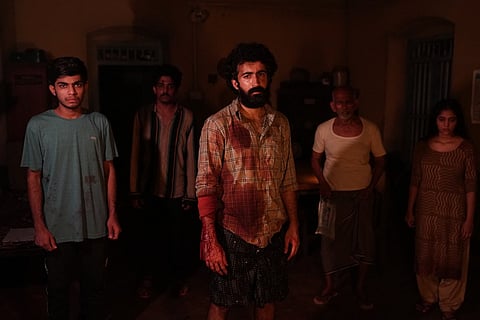

The faultlines in our personal relationships have perhaps never been tested more than in the present political climate where hate and bigotry have been normalised to unprecedented levels. Several people have severed ties with friends and family over poisonous WhatsApp forwards and the arguments that break out over them. Kuruthi, directed by Manu Warrier and written by Anish Pallyal, is a tense exploration of religion, politics, and human relationships within the framework of a home invasion film.
Set in Erattupetta, the story revolves around two families that are united by tragedy. Ibru (Roshan Mathew), who lost his wife and daughter to a landslide, and lives with his brother Rasool (Naslen) and father Moosakka (a superb Mammukoya); and Sumathi (Srindaa) and her brother Preman (Manikandarajan) who lost their respective spouses to the same disaster. Sumathi has feelings for Ibru, but the latter is still grieving and is also unsure about marrying a woman of another faith. One fateful night, a policeman (Murali Gopy) crashes through Ibru's door with Vishnu (Sagar Surya), a youth accused of killing a Muslim man in a melee. Other Muslims thirsting for revenge are after the youth, and it falls upon Ibru's family to keep the cop and the accused safe.
The predicament is reminiscent of Ibru's conversation with his young daughter who is no more. The child had pleaded with him not to sacrifice their goat Manikutti, and Ibru had reasoned with her that they must do so to fulfil their word to God. But does God expect such sacrifices from mortals, and can humans make the decision about whom to slaughter? It's perhaps easy to draw a conclusion when it's a goat's life that's at stake, not so much when it is another man. At least, not to Ibru.
The first half of the film is unpredictable and gripping, with the actors (Shine Tom Chacko, Murali Gopy, Naslen, Roshan and Srindaa doing a fine job) reflecting fear, confusion and increasing suspicion as the circumstances change. Mammukoya's Moosakka is the only unfazed man in the room, and he's a hoot. In his typical Mappila dialect, so beloved to the Malayali audience, he deflates the bigoted opinions of the young people in his trademark comic style. When Vishnu (who's clearly an ardent student of WhatsApp University) starts talking about the atrocities committed by the Mughals, Moosakka wonders if it's necessary to be so involved with the doings of "mayyathaaya rajakammar" (dead kings). In the list of Mughals, he absent-mindedly adds Shah Rukh Khan, asking if he wasn't a good king. Later too, his unsentimental responses and metaphors crack you up in the most unexpected way.
Most of the film is shot in the dark, with the focus on the changing expressions of the characters and the cruelty that they're capable of performing. The action scenes are gimmick-free; the violence here is meant to horrify rather than thrill us. The background score is restrained though the two songs don't really add much to the viewing experience (I'd have preferred Moosakka's commentary to the lyrics in the jungle jeep ride). Roshan Mathew's Ibru is the conscience of the film. As those around him seem to be morphing into people he no longer recognises, he remains steadfast in his beliefs. The actor's conflicted expressions and the sadness in his eyes as he takes in the scene before him, make the viewer feel his urgency.
However, as the film progresses, it becomes a Good Muslim vs. Bad Muslim narrative. While the Hindu characters also spout bigoted lines, one is characterised as a "misguided" youth and another comes up with an explanation that almost sounds "logical". The subtle comparison between the goat and Vishnu, too, is unsettling. We're meant to look at him as a foolish lamb led to slaughter by an unforgiving pack. Most of the Muslim characters, on the other hand, are characterised as violent, religious fanatics who quote the Quran and pick up the knife whenever they get the opportunity.
Prithviraj plays Laiq, a Muslim extremist with international connections. The actor is a pleasure to watch when he allows a character to absorb him entirely -- Koshy in Ayyappanum Koshiyum or Joshua in Koode, for example. But in many a film, he is too conscious of his star persona to submerge himself entirely in the character. Laiq falls in the latter category, though his entry comes as a dramatic surprise.
Watch: Trailer of Kuruthi
We only hear of the violent act committed by the Hindu youth, but in scene after scene, we're shown the graphic sadism of the Muslim fanatics. One cannot ignore the milieu in which Kuruthi has released, and argue that "a film must be watched as a film". At a time when Islamophobia has become mainstream, with calls for genocide of Muslims being openly made in the national capital, the film's skewed representation is dangerous. It also plays into "who started it first" narratives, bypassing the fact that the state machinery in the country has openly colluded with Hindutva extremists in several instances over the past few years. The long drawn-out climax sequence, which turns into a treatise on humanity and faith, ends up ringing hollow and could have been considerably shortened.
In many ways, Kuruthi is like Nayattu. It's an engaging thriller but with questionable politics. You can always close your eyes to the politics, but considering that is the point of the film, how do you still watch it?
The film is now streaming on Amazon Prime Video.
Disclaimer: This review was not paid for or commissioned by anyone associated with the series/film. TNM Editorial is independent of any business relationship the organisation may have with producers or any other members of its cast or crew.